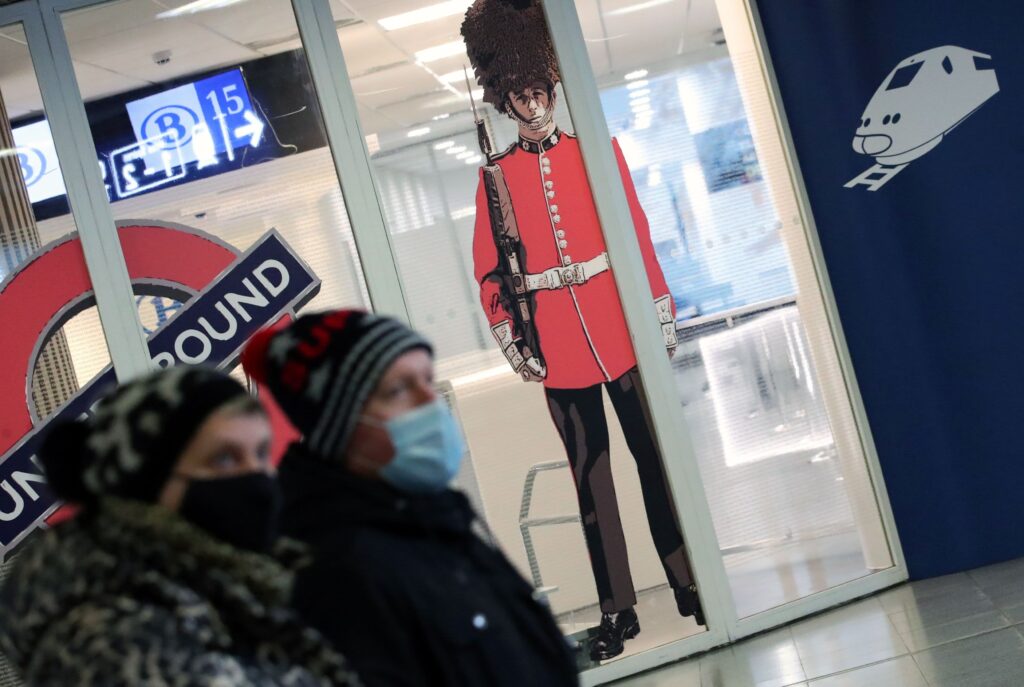‘I think this is already in the U.S.,’ Dr. Scott Gottlieb says of new U.K. Covid strain

Former FDA chief Dr. Scott Gottlieb warned that the highly contagious, new mutation of Covid-19 found in the United Kingdom “is already in the U.S.” as more than 40 countries ban travel to and from the U.K. for 48 hours or more.
“I don’t think a travel ban, at this point, is going to prevent this mutated strain from coming into the United States,” Gottlieb said. “We’re going to have an epidemic that continues to build over the course of the next three or four weeks, we’ll reach a peak, and then we’ll start to see infection rates decline as we see vaccinations get rolled out.”
The new variant of Covid-19 is forcing parts of the United Kingdom back into lockdown. The government imposed the tightest restrictions in London as well as other areas in southeast England, and families are no longer able to gather during Christmas, as previously planned. In an interview on CNBC’s “The News with Shepard Smith” on Monday evening, Gottlieb explained that the new mutation is likely a result of selective pressure on the virus itself.
“As the virus continues to spread around the world, we’re going to start to see more of these variants, and that’s why it’s important to get the population vaccinated and snuff out these infections,” Gottlieb said. “The more infections you have, the more chances that these variants start to propagate.”
Scientists in the U.K. suggested the Covid variant makes the virus 50% more transmissible, however, there’s currently no sign that it makes the disease worse. Both Eli Lilly and Regeneron, which make the antibody drugs to treat Covid, said their medicines should be effective against the variant. According to Reuters, BioNTech Chief Executive Ugur Sahin said his company would investigate the mutation, but looked at the situation with “with a degree of soberness.” BioNTech is Pfizer’s partner on the Covid vaccine. Gottlieb explained to host Shep Smith why he thinks vaccines will need to eventually adapt.
“The question is, is this virus going to change the surface proteins in a way that can obviate either the vaccines or prior immunity, and there’s no indication that it’s doing that right now, but over time it will evolve in ways where it can probably obviate prior infection or vaccines to some degree, so we’ll probably need to adapt our vaccines over time,” Gottlieb said.
The first shipments of Moderna’s Covid vaccine hit hospitals across the U.S. today. Moderna’s vaccine is the second one, after Pfizer’s, to be authorized by the FDA. Moderna’s rollout is expected to be double the size with the company planning to ship six million doses out this week compared to Pfizer’s 2.9 million doses last week. Pfizer’s vaccine requires a temperature of minus 94 degrees Fahrenheit, or minus 70 degrees Celsius. Moderna can store its vaccine for up to six months at minus 4 degrees Fahrenheit.
Gottlieb said that the current logistics for vaccine distribution are “good,” but that some challenges may come as the population getting the vaccine widens.
“I think the challenge is going to be the last mile, trying to distribute these vaccines in the community,” said Gottlieb. “Right now, in the month of December, we’re distributing these vaccines largely to healthcare workers through medical institutions, the academic hospitals, community hospitals, they know how to distribute a vaccine, know how to find their health care workers.”
Disclosure: Scott Gottlieb is a CNBC contributor and is a member of the boards of Pfizer, genetic testing start-up Tempus and biotech company Illumina. Pfizer has a manufacturing agreement with Gilead for remdesivir. Gottlieb also serves as co-chair of Norwegian Cruise Line Holdings′ and Royal Caribbean‘s “Healthy Sail Panel.”






